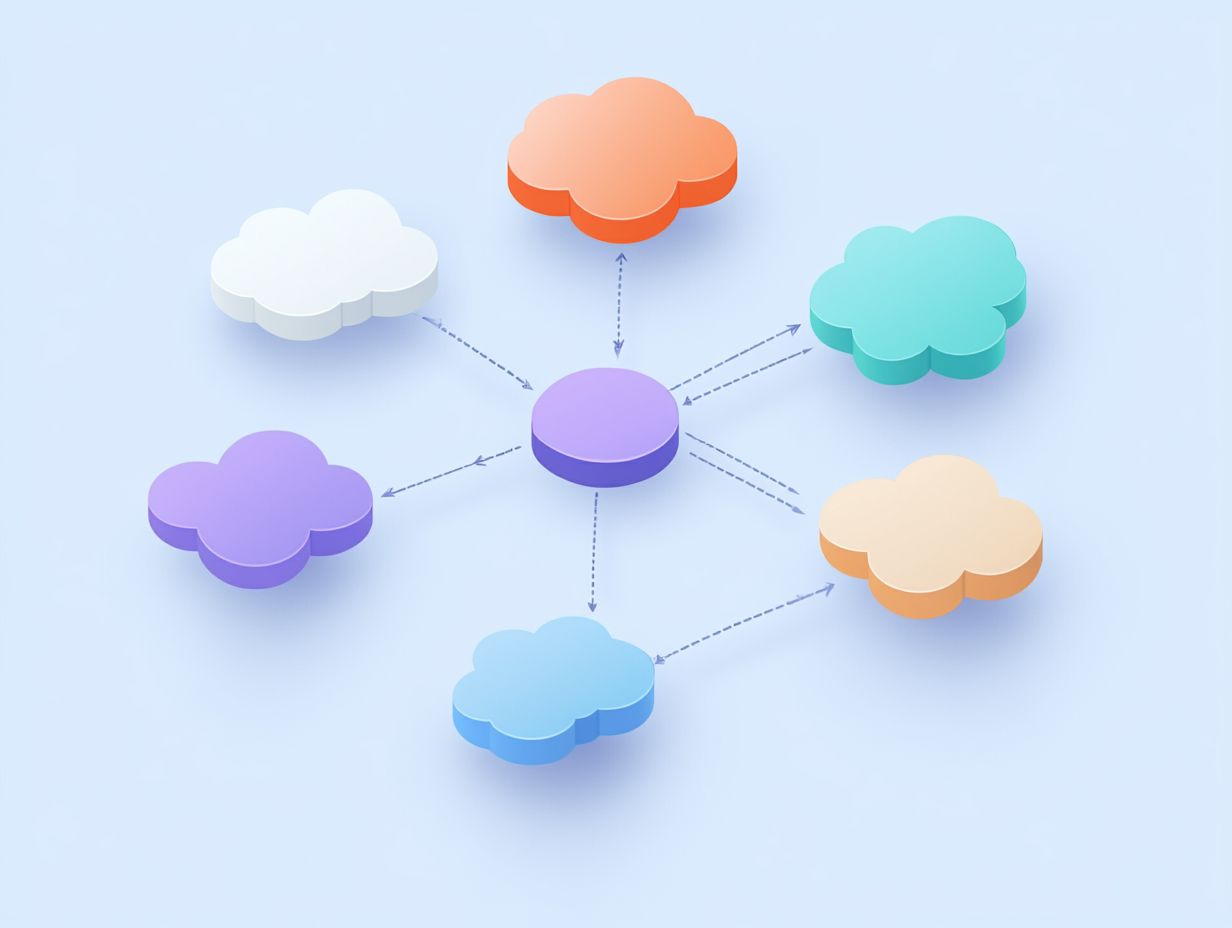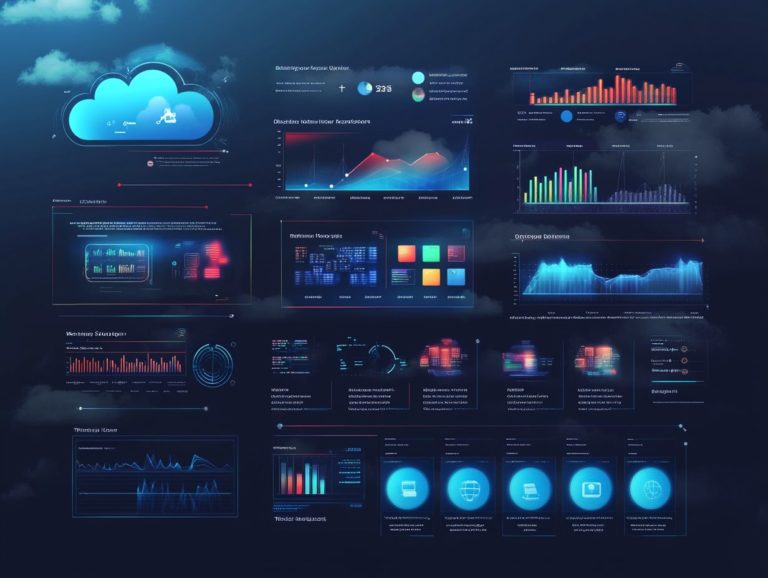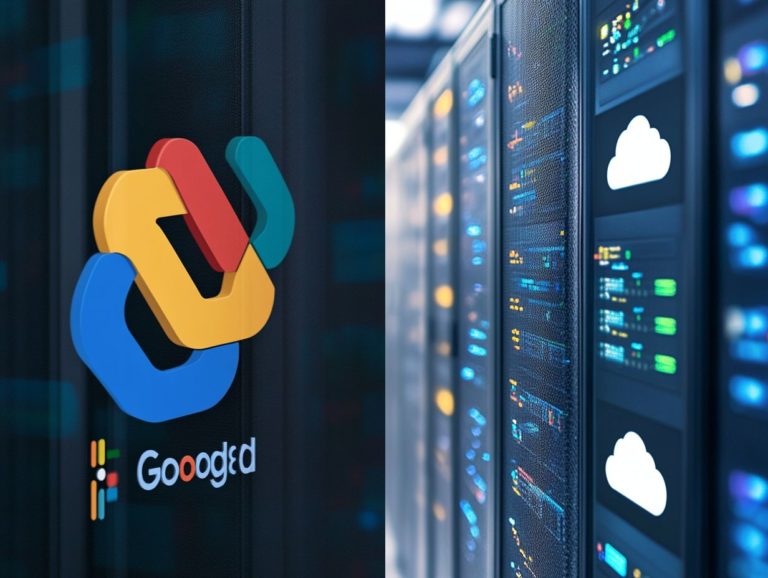5 Cloud Providers with Superior API Integration
In today’s digital landscape, your ability to seamlessly integrate applications through APIs is essential for helping your business work better and be more creative.
This article delves into five leading cloud providers Amazon Web Services, Microsoft Azure, Google Cloud Platform, IBM Cloud, and Oracle Cloud Infrastructure each recognized for their robust API integration capabilities.
You ll gain insights into what API integration entails, why it matters, and the key features to evaluate when selecting a cloud provider. A comparison of these platforms will also be provided.
We ll explore the benefits and potential challenges of API integration, supported by real-world examples of successful implementations.
Start exploring how to choose the best cloud provider for your needs!
Contents
- Key Takeaways:
- 1. Amazon Web Services (AWS)
- 2. Microsoft Azure
- 3. Google Cloud Platform (GCP)
- 4. IBM Cloud
- 5. Oracle Cloud Infrastructure (OCI)
- What Is API Integration and Why Is It Important?
- What Are the Key Features to Look for in a Cloud Provider’s API Integration?
- How Do These Cloud Providers Compare in Terms of API Integration?
- What Are the Benefits of Using a Cloud Provider with Superior API Integration?
- What Are the Potential Challenges of API Integration with These Cloud Providers?
- What Are Some Examples of Successful API Integration with These Cloud Providers?
- Frequently Asked Questions
- What does it mean for a cloud provider to have superior API integration?
- What are the top 5 cloud providers with superior API integration?
- What benefits do cloud providers with superior API integration offer?
- Can I customize the APIs of these cloud providers?
- Are there any costs associated with using APIs from these cloud providers?
- Can I expect reliable and secure API integration from these cloud providers?
Key Takeaways:

- Amazon Web Services (AWS) offers extensive API integration capabilities, making it a top choice for developers and businesses seeking seamless integration of cloud services.
- Microsoft Azure excels in API integration with its comprehensive documentation and support for popular languages, making it a go-to option for those looking for a user-friendly integration experience.
- Google Cloud Platform (GCP) is known for its robust API ecosystem, providing developers with a wide range of tools and resources for seamless integration with other applications and services.
1. Amazon Web Services (AWS)
Amazon Web Services (AWS) serves as a comprehensive cloud services platform, offering an extensive array of features, including API integration. This capability enables seamless communication between various software systems, enhancing your operational efficiency and customer engagement. For enterprises considering options, there are also 5 cloud storage solutions that can further support their needs.
With its robust tools for real-time analytics and automated workflows, AWS positions itself as a leader in the integration platforms market. It provides solutions tailored to the unique needs of enterprises while ensuring data accuracy and compliance.
AWS simplifies API management, allowing you to build and deploy custom connectors that align with your specific workflows. This level of flexibility boosts your scalability options and encourages collaboration across teams and applications.
AWS also facilitates marketing analytics by equipping you with tools that enhance data sharing among diverse enterprise applications. By leveraging these capabilities, you can gain deeper insights into customer profiles, refine your targeting strategies, and ultimately drive growth in a competitive landscape.
2. Microsoft Azure
Microsoft Azure stands as a cutting-edge cloud services platform, offering extensive API integration capabilities that elevate data processing, streamline workflow automation, and enhance customer engagement.
For businesses aiming to optimize operations and boost marketing performance, it becomes an essential tool. This platform simplifies API lifecycle management and boasts robust security features that safeguard sensitive data.
With its user-friendly interface, Azure gives you the power to navigate various integration options effortlessly, regardless of your technical background. The ability to connect with third-party services expands the horizons for app development and operational efficiency, creating a unified data environment.
This comprehensive approach to integration ensures data consistency while fostering enhanced collaboration across teams, ultimately driving productivity and innovation.
3. Google Cloud Platform (GCP)
Google Cloud Platform (GCP) presents a powerful suite of cloud services, offering exceptional API integration capabilities that give you the power to leverage real-time analytics. To fully understand the advantages, check out the 5 unique features of top cloud storage providers which can enhance data flow and elevate customer engagement through sophisticated data transformation techniques.
These integration features enable you to create automated workflows that streamline your operations, allowing your team to focus on strategic initiatives rather than getting bogged down by mundane tasks.
With GCP’s robust error handling mechanisms, seamless communication between different applications is guaranteed, significantly reducing the risk of disruptions.
The platform s scalability ensures that you can easily adjust your resources based on demand, accommodating growth effortlessly.
GCP focuses on security, employing advanced protocols to safeguard sensitive data during sharing. This commitment not only fosters trust among your users but also reinforces compliance with regulatory standards.
4. IBM Cloud

IBM Cloud stands as a versatile cloud services platform, offering robust API integration that streamlines communication between diverse enterprise applications. This optimization of data processing not only enhances operational efficiency but also caters to your evolving needs as a modern business seeking to elevate its technical capabilities.
Using smart error handling helps you quickly spot and fix problems, significantly minimizing downtime and ensuring seamless operations. The platform’s integration solutions extend into marketing analytics, giving you the power to analyze consumer behavior with remarkable precision.
This not only guarantees data accuracy but also ensures adherence to compliance standards, ultimately boosting your customer support efforts. With IBM Cloud s focus on secure and efficient API management, you can cultivate stronger relationships with your customers while driving innovation and growth across various sectors.
5. Oracle Cloud Infrastructure (OCI)
Oracle Cloud Infrastructure (OCI) offers you a powerful environment for API integration. It enables your organization to elevate its business operations through secure and efficient data sharing, real-time analytics, and automated workflows all tailored to meet your diverse customer needs.
What sets this platform apart is its robust security protocols. These ensure that sensitive information is kept safe from unauthorized access while allowing for seamless interaction with third-party services.
By upholding stringent data consistency and providing high-performance computing capabilities, OCI significantly enhances your marketing effectiveness and operational efficiency. When you leverage OCI, you can expect optimized application performance, leading to faster decision-making and improved service delivery.
This will supercharge your business growth in an increasingly competitive landscape!
What Is API Integration and Why Is It Important?
API integration is all about connecting different software systems through tools that help applications communicate with each other. This process enables a seamless flow of data that is essential for optimizing your business operations and driving growth.
By harnessing real-time analytics and automated workflows, API integration gives you the power to meet customer needs effectively. It ensures data accuracy and enhances customer engagement.
In today’s fast-paced world, mastering API integration is essential for survival! It streamlines operational workflows across various sectors, including finance, healthcare, and retail, where timely access to information can significantly influence decision-making.
For example, in the healthcare industry, APIs allow different systems to share patient data efficiently. This not only improves the quality of treatment but also strengthens regulatory compliance.
In the retail sector, seamless API connections between inventory management and e-commerce platforms provide real-time stock updates, greatly enhancing the customer shopping experience.
APIs support a range of integration scenarios, enabling you to leverage multiple services and applications. This fosters innovation and adaptability in an ever-evolving market landscape.
What Are the Key Features to Look for in a Cloud Provider’s API Integration?
- Robust integration capabilities
- User-friendly interface
- Strong security protocols
- Scalability to manage increasing data volumes
- Comprehensive error handling to swiftly address issues
- Support for custom connectors that allow tailored integration setups
These attributes create a cohesive analytical environment, enabling you to make informed decisions and elevate your marketing strategies.
Explore these cloud solutions today and take your business to the next level!
How Do These Cloud Providers Compare in Terms of API Integration?

When you compare major cloud providers in terms of API integration, you’ll uncover distinct strengths and weaknesses that each platform brings to the table. Exploring 5 cloud providers with the best scalability can help you understand how their unique integration solutions can either streamline your operations or introduce potential performance hiccups.
Take AWS, for example. It’s well-known for its vast ecosystem of services that enable seamless integration! This makes it a fantastic choice for companies already utilizing multiple AWS tools. For those considering their options, understanding the 5 criteria for comparing cloud providers is essential, as Azure performs exceptionally well in Microsoft-heavy environments, enhancing synergy and collaboration in enterprise settings.
If data analytics and machine learning are your focus, Google Cloud Platform is likely to catch your eye! It offers robust capabilities that allow you to harness data efficiently.
Then there’s IBM Cloud, celebrated for its enterprise-grade security and hybrid cloud options. These features cater effectively to organizations looking to work closely with legacy systems.
Oracle Cloud Infrastructure deserves mention as well! It s particularly beneficial for businesses centered on relational database integration, providing tailored solutions that fit their needs. By evaluating these differences, you can make informed decisions that significantly enhance your operational efficiency.
What Are the Benefits of Using a Cloud Provider with Superior API Integration?
Using a cloud provider with great API integration brings many benefits, including enhanced data accuracy, streamlined workflows, and improved customer engagement, each playing a crucial role in driving substantial business growth and operational efficiency. For more insights, check out 5 features that differentiate cloud providers.
For example, real-time analytics give you the power to gain instant insights into your operations, allowing you to make informed decisions swiftly and effectively.
Scalability stands out as another critical benefit. It enables you to effortlessly adjust your API capabilities to match growth or evolving market demands without the need to overhaul your entire system.
Robust error handling, or the process of managing mistakes that happen during data transfer, guarantees that you can minimize downtime and maintain a seamless user experience. This is essential for keeping your customers satisfied!
Companies that leverage these integrations like e-commerce platforms linking inventory management systems with customer relationship tools have successfully automated order processing and personalized marketing efforts. This strategic approach leads to increased sales and enhanced customer loyalty, positioning you for long-term success!
What Are the Potential Challenges of API Integration with These Cloud Providers?
Despite the many benefits of API integration, you may encounter challenges when working with various cloud services. Issues like error handling, data consistency, and the complexity of integration solutions can arise!
You may encounter challenges with performance problems stemming from latency between systems, highlighting the importance of optimizing your communication pathways. Security risks also escalate as data traverses various platforms, making it imperative to implement robust measures to safeguard sensitive information.
The demand for technical expertise could further complicate these integrations, especially if your team lacks the necessary skills to manage and troubleshoot complex API environments effectively.
Try these strategies:
- Thorough error logging
- Routine audits for security compliance
- Investing in ongoing training for your technical staff
By doing so, you can be ready to adapt and innovate in this ever-evolving landscape!
What Are Some Examples of Successful API Integration with These Cloud Providers?
API integration with cloud providers is a game changer. Case studies show how businesses can streamline operations and improve customer experiences by leveraging the top cloud providers for startups.
Take Shopify, for instance. They have integrated payment processing APIs to simplify transactions and provide tailored recommendations based on user behavior.
In healthcare, providers use APIs to enhance patient engagement. They access real-time data from multiple applications, giving a complete view of patient health.
In finance, PayPal exemplifies effective API use. They ensure smooth transaction processing, boosting operational efficiency and customer trust.
These examples reveal a critical trend: effective API integration enhances data flow and customer satisfaction across industries.
Frequently Asked Questions

What does it mean for a cloud provider to have superior API integration?
Superior API integration means a cloud provider’s API works well with other systems, making it easier to share data and communicate, especially when considering 5 cloud storage APIs you should know.
What are the top 5 cloud providers with superior API integration?
Here are the top 5 cloud providers you should know: Amazon Web Services (AWS), Microsoft Azure, Google Cloud Platform (GCP), IBM Cloud, and Oracle Cloud.
What benefits do cloud providers with superior API integration offer?
They provide increased automation, improved collaboration, and seamless integration with third-party applications.
Can I customize the APIs of these cloud providers?
Yes, most cloud providers offer customizable APIs to meet your specific business needs.
Are there any costs associated with using APIs from these cloud providers?
Generally, APIs are included in subscription packages. However, fees may apply for specific API calls or if limits are exceeded.
Can I expect reliable and secure API integration from these cloud providers?
Absolutely! These providers are recognized for their reliability and strong security measures that protect customer data.





